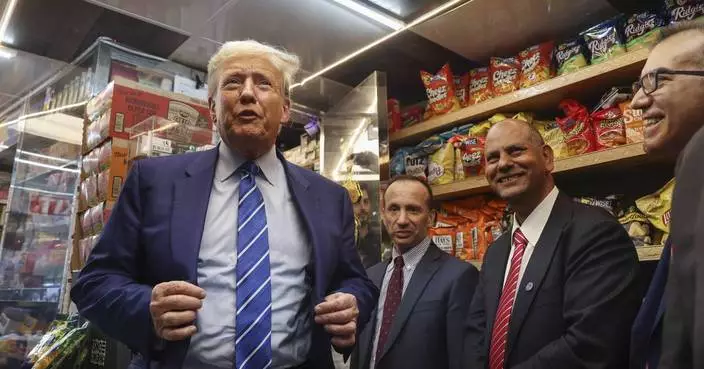Secretary of State Mike Pompeo said Sunday the U.S. was prepared to resume talks with North Korea "at a moment's notice" if the North signaled it wanted discussions about denuclearization.
Pompeo said he hoped that a letter recently sent by President Donald Trump to North Korean leader Kim Jong Un would "provide a good foundation for us to begin to continue these important discussions with the North Koreans to denuclearize the peninsula."
The North's state-run news agency on Sunday described Trump's letter to Kim as "excellent" and reported that Kim said he would "seriously contemplate" the content. What was in the letter was not revealed by U.S. or North Korean officials. White House press secretary Sarah Sanders has said the two leaders have had an ongoing correspondence.
The U.S. has demanded that North Korea abandon its nuclear weapons entirely before international sanctions are lifted. For its part, North Korea wants sanctions to be lifted and other concessions by the U.S. as it moves step by step toward denuclearization.
The second Trump-Kim summit, held last February in Hanoi, ended in failure and formal talks between the two nations broke down. Trump said in June he had received a "beautiful" letter from Kim, not revealing its contents, and recently said had received a "birthday letter" from the North Korean.
Pompeo, who spoke to reporters before leaving Washington for the Mideast, said he hoped working-level talks with North Korea would resume.
"We have been working to lay the foundations for that since Hanoi. We think we're in a better place. I think the remarks you saw out of North Korea this morning suggest that, that may well be a very real possibility.
Pompeo added: "We're ready to go. We're literally prepared to begin at a moment's notice if the North Koreans indicate that they're prepared for those discussions."
WASHINGTON (AP) — The United States on Wednesday imposed new sanctions on hundreds of companies and people tied to Russia's weapons development program, more than a dozen Chinese entities accused of helping Moscow find workarounds to earlier penalties, and individuals linked to the death of Kremlin opposition leader Alexei Navalny.
The actions by the departments of Treasury and State target Russia’s military-industrial base, chemical weapons programs and people and companies in third countries that help Russia acquire weapons components as its invasion of Ukraine has entered its third year.
Treasury Secretary Janet Yellen said the action “will further disrupt and degrade Russia’s war efforts by going after its military industrial base and the evasion networks that help supply it.”
The Senate, meanwhile, gave final approval to legislation barring imports of Russian uranium, boosting U.S. efforts to disrupt Russia’s war in Ukraine. Democratic President Joe Biden is expected to sign the bill into law.
About 12% of the uranium used to produce electricity at U.S. nuclear power plants is imported from Russia, according to the U.S. Energy Information Administration.
A spokesperson for the National Security Council said Wednesday that Biden shares lawmakers’ concerns about U.S. reliance on Russia for low-enriched uranium to support its domestic nuclear fleet.
Included in the administration's announcement are importers of cotton cellulose and nitrocellulose, which are used to produce gunpowder, rocket propellants and other explosives. The penalties also target Russian government entities and people tied to Russia's chemical and biological weapons programs, companies related to Russia's natural gas construction projects and three workers at the penal colony where Navalny died.
Russian President Vladimir Putin has railed against earlier rounds of U.S. and Western penalties, claiming they are “illegitimate sanctions” on his country.
A group of 16 targets in China and Hong Kong, most of which are related to Russian procurement workarounds, are named by the Biden administration.
Yellen traveled to Guangzhou and Beijing last month to warn Chinese officials that they “must not provide material support for Russia’s war and that they will face significant consequences if they do."
China has said it is not providing Russia with arms or military assistance, although Beijing has maintained robust economic connections with Moscow, alongside India and other countries, as the West imposes sanctions.
Companies in China, Azerbaijan, Belgium, Slovakia, Turkey and the United Arab Emirates were accused of helping Russia acquire technology and equipment from abroad. The penalties aim to block them from using the U.S. financial system and bar American citizens from dealing with them.
Biden last week said he would immediately rush badly needed weaponry to Ukraine as he signed into law a $95 billion war aid measure that also included assistance for Israel, Taiwan and other global hot spots.
The upcoming uranium ban is also expected to impact Russian revenues by at least $1 billion. The U.S. banned Russian oil imports after Russia invaded Ukraine in early 2022 but did not against uranium, despite frequent calls to do so by U.S. lawmakers in both parties.
Wyoming Sen. John Barrasso, the top Republican on the Senate Energy and Natural Resources Committee, called the import ban “a tremendous victory” and said it “will help defund Russia’s war machine, revive American uranium production and jumpstart investments in America’s nuclear fuel supply chain.″
“Wyoming has the uranium to replace Russian imports, and we’re ready to use it,″ Barrasso added.
West Virginia Sen. Joe Manchin, a Democrat who heads that Senate committee, said it was "unconscionable” for the U.S. to help make it possible for Putin to “finance his unlawful war against Ukraine” through U.S. reliance on Russian uranium.
Besides the import ban, the legislation frees up $2.7 billion in previously authorized funding to ramp up domestic uranium production.

FILE- This June 6, 2019, file photo shows the U.S. Treasury Department building at dusk in Washington. The United States has imposed new sanctions on hundreds of firms and people tied to Russia’s weapons development program, more than a dozen Chinese firms accused of helping Russia find workarounds to sanctions and individuals tied to the death of Russian dissident Alexey Navalny. The sanctions imposed Wednesday by the Treasury and State departments target Russia’s military-industrial base, chemical weapons programs and people and firms in third countries that help Russia acquire weapons components as its invasion of Ukraine has entered its third year. (AP Photo/Patrick Semansky, File)










